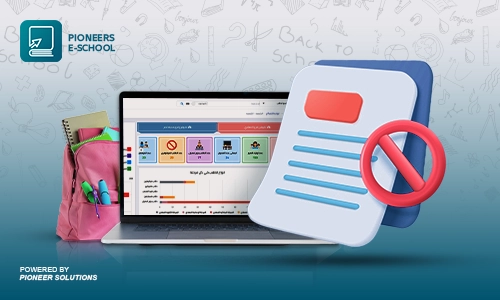Successful school management is essential to ensure efficient teaching and excellent performance in the school environment. This successful management is the foundation for excellence in the educational process and affects many aspects of the school, from the performance of teachers and department heads to parent interaction and student motivation. Therefore, in this article, we will review the concept of school management and the features of successful school management in more detail.
Definition of school administration
School management is the process of effectively organizing and managing a school to ensure that education goals are achieved and that a suitable learning environment is provided to students. School administration can be defined as follows:
School management is a set of processes, practices, and decisions made by the school administration to organize and direct all components and activities within the school, including teachers, staff, students, curricula, material, and financial resources. School management aims to achieve the goals of education, ensure the provision of high-quality education, and develop an educational environment that contributes to the growth and development of students.
School management tasks include developing and implementing educational policies, effectively managing school resources, providing support and guidance to teachers and students, and continuously evaluating and improving school performance. The school management process should be geared towards achieving the best learning outcomes and improving the learning experience for all in the school.
Characteristics of successful school management
Achieving success in school management requires having a set of basic characteristics and skills that characterize successful school management. Here are some important characteristics:
- Vision and Leadership: The ability to set a clear and inspiring vision for the school and direct the team's efforts toward achieving it. The school principal must be a pioneer who leads change and development.
- Effective Leadership: The ability to guide and inspire teachers, staff, and students toward achieving school goals. This includes team motivation skills and building positive relationships.
- Good communication: Ability to communicate effectively with teachers, staff, parents, and third parties. Ability to listen and understand the needs and opinions of individuals.
- Planning and organization: Ability to develop strategic plans to achieve goals and organize resources and activities effectively. They must have strong organizational skills.
- Resilience and adaptation: Ability to deal with changes and challenges flexibly and adapt to changing circumstances in the school and community.
- Data Analysis and Decision Making: The ability to collect and analyze educational data and use it to make informed decisions to improve school performance.
- Justice and Equality: Commitment to providing fair and equal educational opportunities for all students regardless of their background and needs.
- Management skills: Ability to effectively manage school budget, human resources, and administrative processes.
- Attention to quality: Continuous striving to improve the quality of education and school performance through continuous evaluation and improvement.
- Community engagement: Building positive relationships with the local community and partnering with external parties to support education initiatives.
These are some of the essential characteristics that must be present in successful school management. Successful school leaders can guide the school toward excellence and achieve educational goals effectively.
Elements and components of school administration
School management consists of a set of basic components and elements that contribute to the effective organization and management of the school. Here are the components and elements of school management:
- School principal (school principal): The principal is the person who is responsible for the overall management of the school. Makes managerial decisions, coordinates the actions of teachers and staff, and ensures that education goals are met.
- Organizational structure: This component includes the organization of the school and its division into different sections and departments and the distribution of responsibilities and powers between them. This contributes to the achievement of organization and effectiveness.
- Teachers and staff: Teachers and staff form the core part of the school education and management process. They must be recruited, and trained, and their performance evaluated effectively.
- Students: Students are the main beneficiaries of the educational process. Managing their guidance and providing an appropriate learning environment is an essential part of the role of school administration.
- Curriculum and Instruction: This component includes curriculum development, selection of teaching materials, and design of lessons and educational activities.
- Material and financial resources: includes school buildings, equipment, educational materials, and financial budget. These resources must be effectively managed to ensure a safe and appropriate learning environment.
- Policies and Procedures: Clear and equitable policies and procedures should be established to regulate the functioning of the school and achieve its educational objectives.
- Evaluation and monitoring: This component includes evaluating school performance, monitoring student progress, and improving the performance of the educational process.
- Communication and Public Relations**: Relationships with parents, external parties, and the local community play an essential role in supporting the school and achieving its goals.
- Professional Development: Provide professional development opportunities for teachers and staff to contribute to improving the quality of education and developing their skills.
These are the main components of school management, and these components cooperate to achieve the goals of education and ensure the effectiveness of the school's work.
The most important elements of developing successful school management
The development of successful school management is a vital process to ensure the quality of education and the achievement of educational goals. Here are some important steps and principles for the successful development of school management:
- Establish a clear vision: Before anything else, the school administration must define a clear vision that defines the goals and future directions of the school. This vision should be shared between the school leadership and members of the educational team.
- Evaluate current performance: Before you begin to develop any aspects of school management, the administration should assess the current performance of the school. This includes assessing student outcomes, teacher performance, resource use, and other aspects.
- Set development goals: Based on performance evaluation, clear and measurable development goals should be set. These goals can include improving students' literacy or promoting active learning and participation in student activities.
- Coaching and Development: The school should invest in providing ongoing training and development to teachers and management members. This helps in improving education, leadership, and management skills.
- Use of technology and school management systems: Information technology plays a large role in the development of school management. School management systems can be used to facilitate administrative processes and data collection and analysis.
- Communication and partnerships: Strong partnerships with parents and the local community foster the development of school management. These partnerships can include providing additional support and resources to the school.
- Monitoring and evaluating performance: The school administration should monitor the implementation of development plans and evaluate their impact. This helps determine whether strategies are working effectively and achieving desired goals.
- Commitment to continuous improvement: School development is an ongoing process and not a one-time event. School administration must commit to continuous improvement and seek opportunities to improve processes and outcomes.
The development of school management is an investment in the future of education and student success. By implementing these steps and principles, the school can enhance its performance and improve the quality of the education it provides.
Employing a school management system
Successfully developing school management requires making effective use of the school management system. The role of this system can be reviewed as follows:
- Facilitate attendance registration: The school management system helps in accurately and effectively recording and monitoring the attendance of students and teachers, allowing the school to generate various attendance reports.
- Personnel Data Management: The system stores all relevant data about teachers and employees in a single database, making it easier for the school administration to monitor and manage human resources efficiently.
- Facilitation of communication: The system provides effective means of communication that allow quick interaction with parents, students, and teachers. It can publish news and announcements, send emails and texts, and conduct discussions and polls.
- Examination Management: The system can organize and manage exams electronically, starting from preparing exams to estimating and publishing results.
- School Services Management: Principals can use the system to manage school services such as student transportation, supplier management, and updating inventory of educational materials.
- Student Performance Monitoring: The system provides information about student performance and behavior, allows the identification of corrective measures, and the recording and collection of school fees.
- Financial Department: The system allows the school administration to effectively follow up on finances, including processing payments, preparing budgets, and generating financial reports.
By using an effective school management system, schools can efficiently organize their daily activities and operations, contributing to improving the quality of education and overall school management.
Also know: How School Management Systems Enhance Administrative Tasks
If you would like to know more about Pioneers E-School School Management System, register for free on our website. The relevant department will show you how to manage all aspects of the school's educational process with ease!







Related Articles

2025-02-02
Mohamed Abdelsalam
Eliminating Paper Chaos: How Pioneers E-School Transforms Registration and Attendance Processes Digitally
In many schools, reliance on paper records and manual procedures remains the norm, leading to wasted time and increased chances of errors. However, wi...

2024-01-24
Mohamed Abdelsalam
comprehensive guide use of technology in education
Technology is a set of tools and means that help a person improve his life and facilitate his work. Among the areas of use of technology, education is...

2023-03-14
Amgad Hassanain
How to Design School ID Card Using Pioneers E-School System?
The school ID card is an important tool in the educational system, containing personal and academic information for students, and provides multiple fe...





